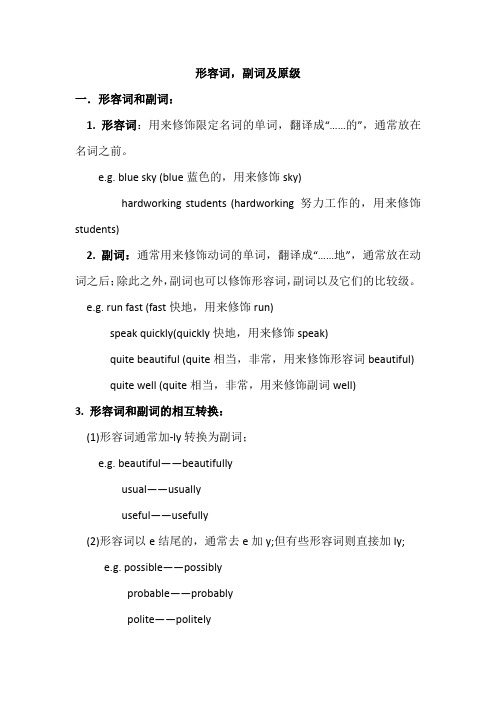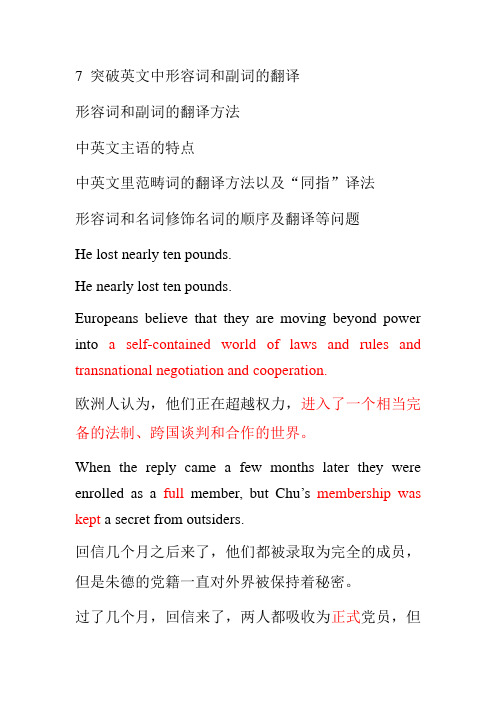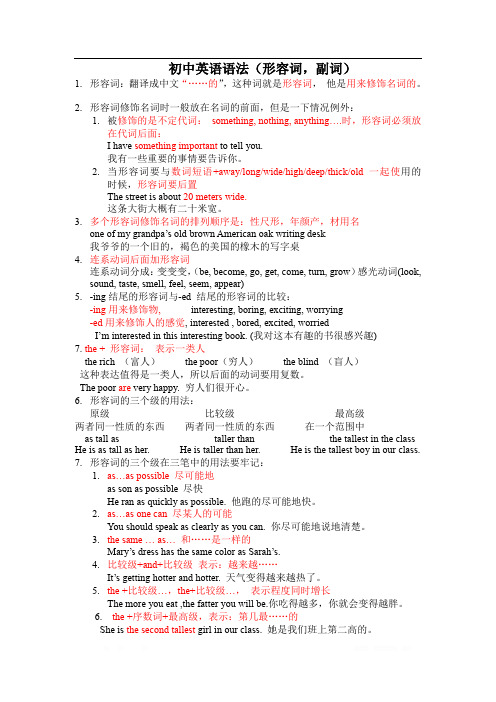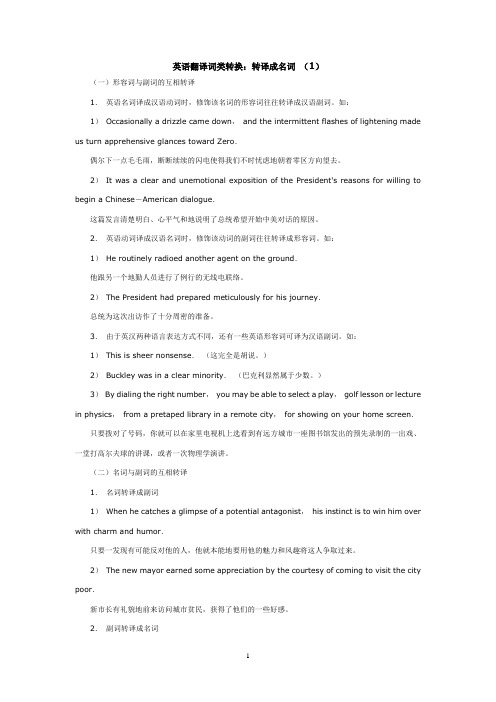形容词与副词的翻译
高中英语语法系列――形容词和副词

高中英语语法系列――形容词和副词[知识梳理]一、形容词的概念与用法形容词(adjective)用以修饰名词,表示人或事物的特征。
它可在句中充当定语,修饰名词、代词;可以作表语或宾(主)语的补足语,表示主语或宾语的状态、特征;有时也可以作状语。
如:This is a beautiful school.这是一所美丽的学校。
(作定语,修饰名词school)I have something important to tell you.我有些重要的事要告诉你们。
(作定语,修饰不定代词something)Our school is beautiful.我们学校很美丽。
(作表语)We’ll make our school more beautiful.我们要使我们的学校更美丽。
(作宾补)Our school will be made more beautiful.我们的学校将会变得更美丽。
(作主补)He got home late that night, hungry and tired.那天晚上他很迟才回来,又累又饿。
(作状语)二、副词的概念与用法副词(adverb)用以修饰动词、形容词或其它副词。
它在句中主要作状语,个别副词也可作表语、定语、或宾(主)语补足语。
He studies hard.他学习很努力。
(作状语,修饰动词)I’m terribly sorry for being late. 非常抱歉,我迟到了。
(作状语,修饰形容词)This coat fits him very well.这件上衣他穿着很合适。
(作状语,修饰副词)The people here are kind to us.这里的人对我们很好。
(作定语,修饰The people)When will you be back? 你什么时候回来?(作表语)三、形容词与副词的转换有的形容词加上ly后可转换成副词,规则如下:注意:friendly, motherly, lovely等词虽然以ly结尾,但不是副词,而是形容词。
形容词,副词及原级

形容词,副词及原级一.形容词和副词:1. 形容词:用来修饰限定名词的单词,翻译成“……的”,通常放在名词之前。
e.g. blue sky (blue蓝色的,用来修饰sky)hardworking students (hardworking努力工作的,用来修饰students)2. 副词:通常用来修饰动词的单词,翻译成“……地”,通常放在动词之后;除此之外,副词也可以修饰形容词,副词以及它们的比较级。
e.g. run fast (fast快地,用来修饰run)speak quickly(quickly快地,用来修饰speak)quite beautiful (quite相当,非常,用来修饰形容词beautiful)quite well (quite相当,非常,用来修饰副词well)3. 形容词和副词的相互转换:(1)形容词通常加-ly转换为副词;e.g. beautiful——beautifullyusual——usuallyuseful——usefully(2)形容词以e结尾的,通常去e加y;但有些形容词则直接加ly;e.g. possible——possiblyprobable——probablypolite——politely(3)但以-ly结尾的单词不一定是副词;e.g. friendly友好的lovely可爱的lonely孤单的deadly致命的(4)有些词既可以作形容词也可以作副词,加了ly之后意思发生改变;或许它本身就是副词。
e.g. hard work辛苦的工作work hard工作努力hardly ever几乎不曾run fast跑得快二.原级1.定义:两者进行比较,后者与前者在某方面相同或不同。
2.形式:(1)肯定形式:…as +形容词或副词的原级+ as…,表示前者和后者一样;(2)否定形式:…not as/so +形容词或副词的原级+ as…,表示前者不如后者。
e.g. He is as friendly as his sister.He is not as/so friendly as his sister.She works as hard as Mary.She doesn’t work as hard as Mary.3.注意:原级针对的词是形容词及副词。
7 突破英文中形容词和副词的翻译

7 突破英文中形容词和副词的翻译形容词和副词的翻译方法中英文主语的特点中英文里范畴词的翻译方法以及“同指”译法形容词和名词修饰名词的顺序及翻译等问题He lost nearly ten pounds.He nearly lost ten pounds.Europeans believe that they are moving beyond power into a self-contained world of laws and rules and transnational negotiation and cooperation.欧洲人认为,他们正在超越权力,进入了一个相当完备的法制、跨国谈判和合作的世界。
When the reply came a few months later they were enrolled as a full member, but Chu’s membership was kept a secret from outsiders.回信几个月之后来了,他们都被录取为完全的成员,但是朱德的党籍一直对外界被保持着秘密。
过了几个月,回信来了,两人都吸收为正式党员,但是朱德的党籍对外一直保密。
短句“剥洋葱”FullMore than eight years have passed since Vice Premier Deng Xiaoping and I joined hands to establish full diplomatic relations between these two great nations.自从邓小平副总理和我联手在我们两个伟大的国家之间建立了正式的外交关系以来,已经过去八年多了。
They were enrolled as full member.Chu’s membership was kept a secret from outsider.I was like that ship before my education began,only I was without compass or sounding-line, and had no way of thinking how near the harbor was.我在我的教育开始之前就像那条船,只是我没有罗盘和声音的绳子,也不知道海港究竟有多近。
(完整版)副词与形容词的用法

副词和形容词一、形容词的用法1.形容词修饰名词,并且放在名词的前面,这时形容词在句子中作定语例如: a beautiful lady、a tall man、a big houseA beautiful lady is standing in front of a tall man.2.形容词放在be动词的后面,这时形容词在句子中作表语/主语补足语。
例如:The lady is tall. (tall在句子中作表语,说明lady是怎么样的)The beautiful lady is tall. (beautiful在句子中作定语,tall作表语)The beautiful lady is tall and slim.3.形容词放在连系动词(become成为、seem看起来、taste尝起来、look看起来、smell闻起来、feel摸起来/感觉、turn变成,等等)后面,在句子中作表语/主语补足语。
例如:The leaf (叶子) turned yellow.树叶变黄了。
She looks beautiful./ He looks handsome. 她看起来漂亮。
/他看来帅气。
The food taste good. 这些食物好吃。
The sweater feels soft. (柔软的;舒服的)He becomes careful. (小心的) 他变得小心了。
The flower smells very good. 花闻起来很香。
Everything seems good. 一切看起来都好。
二、副词的用法1.副词修饰动词,并且通常放在实义动词后面,这是副词在句子中作方式状语。
例如:The man runs fast. (fast修饰runs这个动作)She jumps high. (high修饰jump这个动作)He finished his homework quickly. (quickly修饰finished这个动作)2.副词修饰形容词,并且通常放在形容词的前面例如:He becomes very handsome.She looks very beautiful.The lady is very tall and slim.在“副词+形容词”这样的结构中,中心词是形容词,副词只是为了说明程度大小即:very handsome的中心词是handsome3.副词前面也可以加副词,例如上面的句子都可以改写成:The man runs very fast.She jumps very high.He finished his homework very quickly.very本身是副词,意思是“非常,很”,所以后面也可以跟副词或者形容词。
初中英语语法与词汇(形容词,副词)

初中英语语法(形容词,副词)1.形容词:翻译成中文“……的”,这种词就是形容词,他是用来修饰名词的。
2.形容词修饰名词时一般放在名词的前面,但是一下情况例外:1.被修饰的是不定代词:something, nothing, anything….时,形容词必须放在代词后面:I have something important to tell you.我有一些重要的事情要告诉你。
2.当形容词要与数词短语+away/long/wide/high/deep/thick/old 一起使用的时候,形容词要后置The street is about 20 meters wide.这条大街大概有二十米宽。
3.多个形容词修饰名词的排列顺序是:性尺形,年颜产,材用名one of my grandpa’s old brown American oak writing desk我爷爷的一个旧的,褐色的美国的橡木的写字桌4.连系动词后面加形容词连系动词分成:变变变,(be, become, go, get, come, turn, grow)感光动词(look, sound, taste, smell, feel, seem, appear)5.-ing结尾的形容词与-ed 结尾的形容词的比较:-ing用来修饰物,interesting, boring, exciting, worrying-ed用来修饰人的感觉, interested , bored, excited, worriedI’m interested in this interesting book. (我对这本有趣的书很感兴趣)7. the + 形容词:表示一类人the rich (富人)the poor(穷人)the blind (盲人)这种表达值得是一类人,所以后面的动词要用复数。
The poor are very happy. 穷人们很开心。
6.形容词的三个级的用法:原级比较级最高级两者同一性质的东西两者同一性质的东西在一个范围中as tall as taller than the tallest in the class He is as tall as her. He is taller than her. He is the tallest boy in our class.7.形容词的三个级在三笔中的用法要牢记:1.as…as possible 尽可能地as son as possible 尽快He ran as quickly as possible. 他跑的尽可能地快。
形容词与副词的翻译

darted toward the door. ? 他在主人耳边匆忙说了声“再见”,冲向门外。
2.英语中be+形容词,转换成汉语谓语动词
? Some people will say if you ' re a Gemini( 双子座), you' re more aggressive.
? 我第ห้องสมุดไป่ตู้次离开家这么长时间,所以有些想家了。
? It is the first time for me to be away from home so long, so I am homesick now.
? 考前我对自己很有信心,但现在我说不准自己是否 考得很好。
? Before the exam, I was confident of myself. But now I'm not sure whether I did well in the exam.
? 这篇发言清楚明白、心平气和地说明了总 统希望开始中美对话的原因。
? It' s common for boys at this age to get a little argumentative, restless and moody.
? 男孩在这个年纪多会变得喜欢顶嘴、没有 定性,容易生气。
? 我深信学生将更有创造性,更愿意和大人合 作。
? 有人认为如果你是双子座,就会更咄咄逼人。 ? Steven was eloquent and elegant, but soft. ? 史蒂夫口才雄辩、风度翩翩,但是为人软弱。 ? You' re ignorant of the duties you undertake in
常见的英语翻译中的词类转换

英语翻译词类转换:转译成名词(1)(一)形容词与副词的互相转译1.英语名词译成汉语动词时,修饰该名词的形容词往往转译成汉语副词。
如:1)Occasionally a drizzle came down,and the intermittent flashes of lightening made us turn apprehensive glances toward Zero.偶尔下一点毛毛雨,断断续续的闪电使得我们不时忧虑地朝着零区方向望去。
2)It was a clear and unemotional exposition of the President's reasons for willing to begin a Chinese-American dialogue.这篇发言清楚明白、心平气和地说明了总统希望开始中美对话的原因。
2.英语动词译成汉语名词时,修饰该动词的副词往往转译成形容词。
如:1)He routinely radioed another agent on the ground.他跟另一个地勤人员进行了例行的无线电联络。
2)The President had prepared meticulously for his journey.总统为这次出访作了十分周密的准备。
3.由于英汉两种语言表达方式不同,还有一些英语形容词可译为汉语副词。
如:1)This is sheer nonsense.(这完全是胡说。
)2)Buckley was in a clear minority.(巴克利显然属于少数。
)3)By dialing the right number,you may be able to select a play,golf lesson or lecture in physics,from a pretaped library in a remote city,for showing on your home screen.只要拨对了号码,你就可以在家里电视机上选看到有远方城市一座图书馆发出的预先录制的一出戏、一堂打高尔夫球的讲课,或者一次物理学演讲。
英汉对比形容词和副词

THANKS FOR WATCHING
感谢您的观看
ห้องสมุดไป่ตู้
详细描述
英语和汉语在表达方式和语义上有很大的差 异,如果译者对某一方的语义理解不够深入 ,就容易在形容词或副词的使用上出现错误 。例如,英语中“beautiful”常用于描述 女性,而在汉语中“美丽的”不仅用于描述 女性,还可以用于描述风景、建筑等。
语法结构错误
总结词
由于对英语或汉语的语法结构掌握不准确, 导致形容词或副词的语法使用出现错误。
英语中程度副词可以表示强调 或减弱语气,而汉语中程度副 词则更注重表示程度的大小。
频率副词的对比
英语和汉语中都有频率副词,如 “总是”、“经常”、“偶尔”
等。
英语中频率副词可以修饰动词、 形容词或副词,而汉语中频率副
词通常修饰动词。
英语中频率副词可以表示动作发 生的频率,而汉语中频率副词则 更注重表示动作发生的频繁程度。
04
英汉形容词和副词的翻 译技巧
直译法
总结词
直接翻译,保留原文形式和意义
详细描述
直译法是翻译中最为基础的方法 ,它尽可能地保留原文的词汇、 语法和修辞特点,力求使译文与 原文在意义和风格上达到一致。
意译法
总结词
解释原文含义,调整表达方式
详细描述
当直译法无法保留原文的修辞或表达方式时,可以采用意译法。意译法更注重于解释原 文的含义,而不是保留原文的表达方式,因此在翻译过程中可能需要调整语法结构或修
详细描述
英语和汉语中有些描述性形容词的语义和用法不完全对应 。例如,“happy”在英语中表示高兴、愉快,而在汉语 中则可以表示幸福、愉快、满足等多种含义。
限定性形容词的对比
总结词
- 1、下载文档前请自行甄别文档内容的完整性,平台不提供额外的编辑、内容补充、找答案等附加服务。
- 2、"仅部分预览"的文档,不可在线预览部分如存在完整性等问题,可反馈申请退款(可完整预览的文档不适用该条件!)。
- 3、如文档侵犯您的权益,请联系客服反馈,我们会尽快为您处理(人工客服工作时间:9:00-18:30)。
湖北师范大学外国语学院大学英语部
第四讲 英语形容词和副词的
翻译
英语形容词的翻译
1.英语形容词,转换成汉语副词 2.英语中be+形容词,转换成汉语谓语动词 3.英语中同源形容词,转换成汉语动词 4.英语形容词,转换成汉语名词
1.英语形容词,转换成汉语副词
• The modern world is experiencing rapid development of science and technology.
• 我第一次离开家这么长时间,所以有些想家了。
• It is the first time for me to be away from home so long, so I am homesick now.
• 考前我对自己很有信心,但现在我说不准自己是否 考得很好。
• Before the exam, I was confident of myself. But now I’m not sure whether I did well in the exam.
• 他为人宽容、富有爱心,朋友们都很喜欢 他。
4.英语形容词,转换成汉语名词
• the needy 穷人 • the unemployed 失业者 • the handicapped 残疾人 • the rich are not always happy. • 富人未必总是幸福的。 • Nylon is nearly twice as strong as natural silk. • 尼龙的强度几乎是天然丝的两倍。
• 校方很支持我们的计划. • The school authority is very supportive of our plan. • 不要总是批评别人的工作. • Don’t always be critical of others’ work all the time. • 一种文化及其语言就像大脑与身体一样不可分割. • A culture and its language are as inseparable as brain and
3.英语中同源形容词,转换成汉语动词
• A solar cell is reproductive by itself under any circumstances.
• 太阳能电池在任何情况下都能自行充电。 • We are all concerned for her safety. • 我们都很担心她的安全。 • We are hopeful of success in the business. • 我们希望生意做成。 • Water is incompatible with fire. • 水火不相容。 • It is profitable to import food. • 做进口食品的买卖可以赚钱。 • Only those with working experience of at least two years
are eligible to apply for the position. • 有工作经验的人才有资格申请这个职位。
• He is very pushy with the strangers. • 他很爱在陌生人面前出风头。
• Tolerant and loving, he is popular among friends.
• 当今世界科技正迅速发展。 • He whispered a hurried good-bye to his host and
darted toward the door. • 他在主人耳边匆忙说了声“再见”,冲向门外。
2.英语中be+形容词,转换成汉语谓语动词
• Some people will say if you’re a Gemini(双子座), you’re more aggressive.
• I firmly believe that the students would be more creative and more cooperative with adults.
• 我喜欢读这份报纸,因为它信息量大,娱乐 性强、具有很强的可读性。
• I like reading the newspaper, for it is informative, entertaining and really readable.
• 有人认为如果你是双子座,就会更咄咄逼人。 • Steven was eloquent and elegant, but soft. • 史蒂夫口才雄辩、风度翩翩,但是为人软弱。 • You’re ignorant of the duties you undertake in
marrying. • 你完全不懂在婚姻方面承担的责任。
• 这篇发言清楚明白、心平气和地说明了总 统希望开始中美对话的原因。
• It’s common for boys at this age to get a little argumentative, restless and moody.
• 男孩在这个年纪多会变得喜欢顶嘴、没有 定性,容易生气。
• 我深信学生将更有创造性,更愿意和大人合 作。
• Obedience is obligatory on a soldier. • 服从命令是军人的天职。 • All metals tend to be ductile. • 所有金属都有延展性。
Exercise
• It was a clear and unemotional exposition of the president’s reasons for willing to begin a Chinese-American dialogue.
• 那所学校的学生合作得很好,所以我们很快就完成了 问卷.
• The students in that school were very cooperative, so we finished the questionnaire very soon.
• 尽管我同情你,但我的确不能够帮ห้องสมุดไป่ตู้你.
• Although I am sympathetic with you, I really can’t help you.
